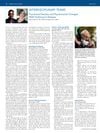 16 citations,
January 2011 in “Indian Journal of Dermatology”
16 citations,
January 2011 in “Indian Journal of Dermatology” Most patients with cicatricial alopecias face significant psychological and social challenges due to their hair loss.
 33 citations,
November 2006 in “Survey of Ophthalmology”
33 citations,
November 2006 in “Survey of Ophthalmology” Madarosis is the loss of eyelashes and eyebrows due to various health issues and requires thorough examination to diagnose and treat the underlying cause.
36 citations,
December 2014 in “F1000 prime reports” The document concludes that Hidradenitis suppurativa is often underdiagnosed, lacks definitive treatment, and requires better awareness and management strategies.
 30 citations,
September 2020 in “Journal of Patient-Reported Outcomes”
30 citations,
September 2020 in “Journal of Patient-Reported Outcomes” Alopecia Areata (AA) causes significant emotional distress, including feelings of embarrassment, depression, and anxiety, and impacts social interactions and daily activities.
 16 citations,
January 2013 in “Indian Journal of Dermatology, Venereology and Leprology”
16 citations,
January 2013 in “Indian Journal of Dermatology, Venereology and Leprology” New treatments and early diagnosis methods for permanent hair loss due to scar tissue are important for managing its psychological effects.
 31 citations,
July 2017 in “Stem cell investigation”
31 citations,
July 2017 in “Stem cell investigation” Platelet-rich plasma (PRP) is a simple, cost-effective treatment that promotes hair growth and reduces hair loss, with high patient satisfaction.
 61 citations,
January 2013 in “Indian Journal of Dermatology, Venereology and Leprology”
61 citations,
January 2013 in “Indian Journal of Dermatology, Venereology and Leprology” Hair usually grows back 1-3 months after treatment for anagen effluvium, and children with Loose Anagen Hair Syndrome often improve by adolescence.
 159 citations,
July 2006 in “Endocrine Reviews”
159 citations,
July 2006 in “Endocrine Reviews” Estrogens significantly influence hair growth by interacting with receptors in hair follicles and may help regulate the hair growth cycle.
 79 citations,
January 2018 in “Wiley Interdisciplinary Reviews-Developmental Biology”
79 citations,
January 2018 in “Wiley Interdisciplinary Reviews-Developmental Biology” Understanding how baby skin heals without scars could help develop treatments for adults to heal wounds without leaving scars.

Using microneedling with PRP improves skin and hair conditions more than microneedling alone.
 February 2024 in “The Open dermatology journal”
February 2024 in “The Open dermatology journal” Alopecia Areata affects people of all ages worldwide, is likely caused by genetic and environmental factors, and can lead to stress and depression, highlighting the need for treatments that address both physical and mental health.
 74 citations,
January 1998 in “Dermatology”
74 citations,
January 1998 in “Dermatology” Men who think they are losing hair feel worse about themselves, especially if they are younger.
 October 2024 in “World Journal of Psychiatry”
October 2024 in “World Journal of Psychiatry” Stress worsens hair loss in androgenetic alopecia.
 November 2023 in “International journal of biology, pharmacy and allied sciences”
November 2023 in “International journal of biology, pharmacy and allied sciences” Herbal treatments can help with hair problems, but more research is needed.

Nanocarriers with plant extracts show promise for safe and effective hair growth treatment.
 46 citations,
August 2019 in “Journal of the European Academy of Dermatology and Venereology”
46 citations,
August 2019 in “Journal of the European Academy of Dermatology and Venereology” People with hair loss conditions experience more anxiety, depression, and a lower quality of life than those without these conditions.
 4 citations,
November 2022 in “Frontiers in Medicine”
4 citations,
November 2022 in “Frontiers in Medicine” People with alopecia areata are more likely to have anxiety and depression and a lower quality of life.
 35 citations,
January 2014 in “BioMed Research International”
35 citations,
January 2014 in “BioMed Research International” Female pattern hair loss involves hormonal factors, genetics, and may be linked to low ferritin levels.
 6 citations,
May 2022 in “Frontiers in Medicine”
6 citations,
May 2022 in “Frontiers in Medicine” The study suggests pandemic stress might worsen or trigger hair loss problems.
 8 citations,
January 2016 in “European Journal of Plastic Surgery”
8 citations,
January 2016 in “European Journal of Plastic Surgery” PRGF treatment is safer and more effective for hair loss than topical minoxidil.
 26 citations,
May 2017 in “Lasers in Medical Science”
26 citations,
May 2017 in “Lasers in Medical Science” Laser therapy and hair growth factors significantly improve hair density in male baldness.

The interdisciplinary approach improved the quality of life for a Parkinson's patient and eased staff workload.
 26 citations,
January 2017 in “Journal of Clinical Pediatric Dentistry”
26 citations,
January 2017 in “Journal of Clinical Pediatric Dentistry” Dental erosion is common in adolescents and is linked to diet and higher socioeconomic status.
12 citations,
May 2019 in “Journal of cosmetic dermatology” Effective treatments for premature hair graying still require significant research.
 29 citations,
January 2016 in “International Journal of Dermatology”
29 citations,
January 2016 in “International Journal of Dermatology” Longer hair loss leads to more severe CCCA; early treatment and avoiding damaging hairstyles help regrowth.
 3 citations,
December 2019 in “Journal of Cosmetic and Laser Therapy”
3 citations,
December 2019 in “Journal of Cosmetic and Laser Therapy” PRGF treatments increased hair number and thickness in people with hair loss, with more injections leading to better results.
 53 citations,
September 2017 in “BMJ Open”
53 citations,
September 2017 in “BMJ Open” Nearly all elderly nursing home residents had a skin disease, with dry skin being the most common.
 162 citations,
August 2004 in “Journal of Investigative Dermatology”
162 citations,
August 2004 in “Journal of Investigative Dermatology” Hair loss causes stress and affects mental health; treatment and support needed.
 12 citations,
May 2017 in “Journal of Dermatological Treatment”
12 citations,
May 2017 in “Journal of Dermatological Treatment” Adult acne severity is influenced by stress, skin sensitivity, makeup, stopping oral contraceptives, and requires female-specific treatment guidelines.

New treatments for hair loss show promise, including plasma, stem cells, and hair-stimulating complexes, but more research is needed to fully understand them.




























